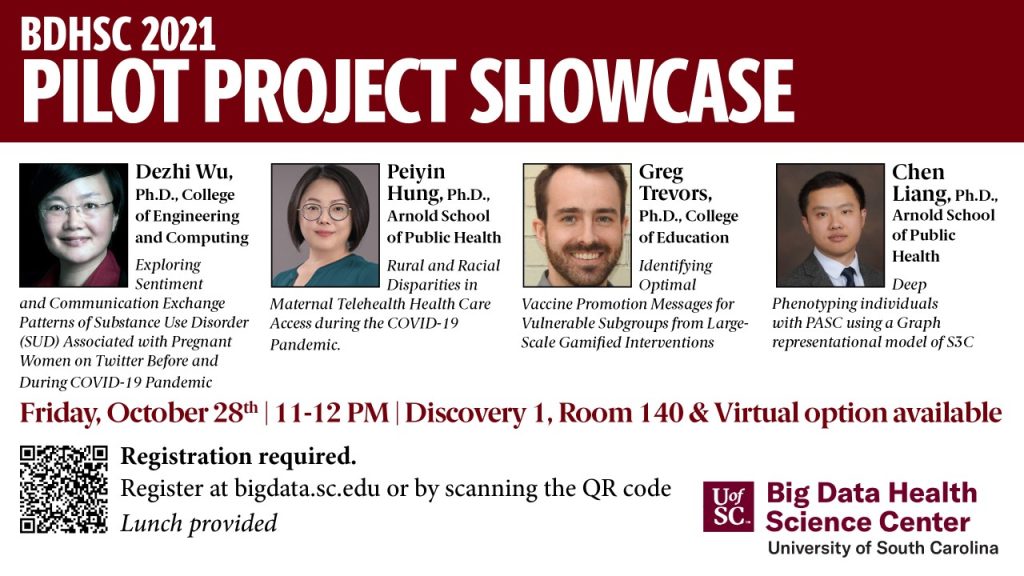
- This event has passed.
BDHSC Pilot Project Showcase
October 28, 2022 @ 11:00 am - 12:00 pm

Join us as we hear about the projects of four 2021 Big Data Health Science Center Pilot Project Recipients!
Friday, October 28 from 11-12pm
In-person: Discovery 1, Room 140 and virtual option available
Registration required. Register at in-person: https://docs.google.com/forms/d/e/1FAIpQLScNdjmGrrp3u2bfyZtsGMvvV7VAJ7T7Y0FXT2qm0jSOvo2w9w/viewform?usp=sf_link
Virtual: https://us02web.zoom.us/webinar/register/WN_znlpwqA5SKuS7277fz2lrg or by scanning the QR code below.
Lunch provided.
Dezhi Wu, Ph.D., College of Engineering and Computing
Exploring Sentiment and Communication Exchange Patterns of Substance Use Disorder (SUD) Associated with Pregnant Women on Twitter Before and During COVID-19 Pandemic
Substance use among pregnant women is a significant public health concern. Recent studies have shown an alarming increase in substance use; however, it is still unknown how the COVID-19 pandemic has impacted vulnerable pregnant women. We applied NLP, text mining and machine learning techniques to extract just-in-time substance use (SU) data among pregnant women on Twitter, and then explored their communication patterns, risky health perceptions, sentiment, and maternal and fetal health outcomes. Our study findings are informative to perinatal healthcare practice and related public health policy changes.
Peiyin Hung, Ph.D., Arnold School of Public Health
Rural and Racial Disparities in Maternal Telehealth Health Care Access during the COVID-19 Pandemic.
Ensuring equitable telehealth uptake in prenatal care is critical for the optimal outcomes of newly developed prenatal care guidelines. This study aims to quantify the trends of prenatal care via telehealth before and during the COVID-19 pandemic, and assess the variations by maternal race, ethnicity, and residence. We used a statewide Medicaid claims data for Medicaid-insured women in South Carolina to assess prenatal telehealth uptake before and during the COVID-19 pandemic. Using an interrupted time series approach, we found that prenatal care visits via telehealth uptake increased substantially at the beginning of the COVID-19 pandemic, decreased within a few months, but remained more prevalent than the pre-pandemic rates. This study highlights the disproportionate telehealth access among rural women and women from racial minority groups who have historically faced barriers to accessing prenatal care.
Greg Trevors, Ph.D., College of Education
Identifying Optimal Vaccine Promotion Messages for Vulnerable Subgroups from Large-Scale Gamified Interventions
The long-term goal of this project is to inform the design of subsequent digital health promotion interventions that will dynamically personalize to participants based on empirical insights gained from machine learning analyses on our large-scale digital intervention data. To accomplish these long-term goals, the immediate objectives in this proposal are (1) identify distinct vaccine hesitancy subgroups from our prior intervention participants; and (2) identify optimal content that is associated with an increase likelihood of healthy behavioral intentions and attitudes, including vaccine intent and confidence, for each VH subgroup.
Chen Liang, Ph.D., Arnold School of Public Health
Deep Phenotyping individuals with PASC using a Graph representational model of S3C
Studies found 47-87% of patients with persistent symptoms and multi-system organ dysfunction after the acute phase of COVID-19, denoted as Post-Acute Sequela of SARS-CoV-2 infection (PASC). Leveraging a biomedical informatics and data science approach, we will design an innovative Graph representational model on top of a multi-center clinical dataset [South Carolina COVID-19 Cohort (S3C), NIH/NIAID R01A127203-4S1]. Using this Graph model, we will develop and pilot test a new semi-supervised machine-learning deep phenotyping algorithm to identify individuals with PASC and characterize their electronic phenotypes. This study will result in a clinically plausible, interpretable, generalizable, and high-throughput deep phenotyping algorithm application for identifying possible PASC cases at COVID-19 recovery clinics, supporting patient referral, outreach, and therapeutics development.
